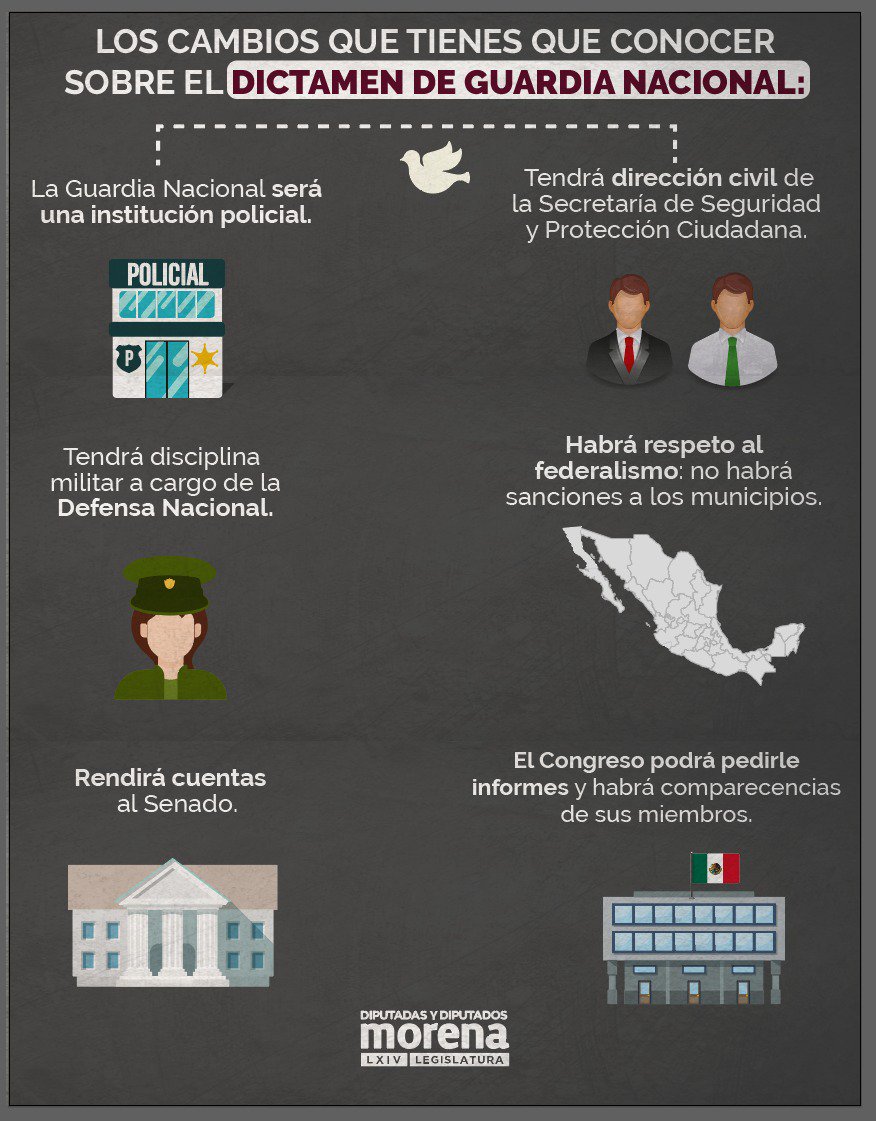 Mexican President Andres Manuel Lopez Obrador announced even before December 1, 2018, when he assumed power, that he would create a National Civil Guard (Guardia Civil Nacional), which would unite the operations of the Army, the Navy and the Federal Police (i.e., the police and two branches of the Armed Forces) to guarantee internal security and public safety, but he made clear that the Armed Forces would not be used to "repress the people". According to Lopez Obrador, this National Guard will limit the use of force and will guarantee human rights. Lopez Obrador won the Presidency with the most votes in the history of Mexico, and his party, Morena, won a majority in both houses of Congress.
Mexican President Andres Manuel Lopez Obrador announced even before December 1, 2018, when he assumed power, that he would create a National Civil Guard (Guardia Civil Nacional), which would unite the operations of the Army, the Navy and the Federal Police (i.e., the police and two branches of the Armed Forces) to guarantee internal security and public safety, but he made clear that the Armed Forces would not be used to "repress the people". According to Lopez Obrador, this National Guard will limit the use of force and will guarantee human rights. Lopez Obrador won the Presidency with the most votes in the history of Mexico, and his party, Morena, won a majority in both houses of Congress.Security is the number one issue for Mexicans. President Lopez Obrador faced the worst wave of violence in the recent history of Mexico, with 33,341 Mexicans killed in 2018, the largest number since official statistics began to be collected in 1997. Homicides began to escalate in 2006 when President Felipe Calderon (2006-2012) began a military offensive against organized crime. Under his successor, Enrique Pena Nieto (2012-2018) they continued to climb. More than 200,000 persons have been killed violently in Mexico since the war on organized crime began in 2006.
Reportedly organized crime in Mexico is not only drug-trafficking. Many gangs make money by robbing freight trains and extorting money from civilians or by the illegal extraction of oil, "huachicoleo", a phenomenon that has escalated 790% in the last 5 years according to the state oil company, Pemex. People siphon off oil, transport it and resell it. A pipeline is reportedly tapped somewhere in Mexico every 90 minutes.
Although Lopez Obrador promised to send the troops back to their barracks since they have been accused of committing human rights violations and atrocities for many years. Critics fear that the creation of the Guardia Nacional will militarize Mexico even more than the previous governments did. The Guardia Nacional is under the responsibility of the President, and under him, the Secretary of Security, Alfonso Durazo. But the day to day operations fall to the Secretary of Defense, a member of the military. The Federal Police will disappear as its 20,000 members will be incorporated into the new Guardia Nacional.
Despite the fact that Mexico has been a party to the International Criminal Court for almost two decades, none of the complaints presented against Mexico for crimes against humanity and other serious human rights violations have been taken up by the Court.
On January 16, 2019, the constitutional reforms for the creation of the Guardia Nacional were approved by the lower house of Congress, but they excluded the modification of Art. 21 of the Mexican Constitution, which would have recognized fully the jurisdiction of the ICC in the country. The reforms approved by the lower house are pending ratification by the Senate, and they also permit military courts to take jurisdiction over cases of serious violations of human rights committed by the members of the military.The reforms approved by the lower house established that the crimes committed by members of the Guardia Nacional, in the exercise of their duties, will be heard by civilian authorities, while the misdemeanors and offenses against military discipline will be heard by military courts. But the Code of Military Justice opens up the possibility that the crimes committed by members of the Army, Air Force and the Navy against civilians can be investigated by military tribunals.
Another suggestion for reform of Article 16 of the Constitution established that under no circumstance would a detainee be transferred to or held in a military installation. In a later version, it was specified that the detainees should be turned over, without delay, exclusively to civilian authorities. But the final version was: "The detainees should be placed at the disposition of the appropriate civilian authorities." That means that the present practice is maintained: that is, in many cases the military first takes the detainees to the military barracks in order to interrogate or torture them and then turns them over to the civilian authorities.
No comments:
Post a Comment
Comments are subject to moderation and must be submitted under your real name. Anonymous comments will not be posted (even though the form seems to permit them).